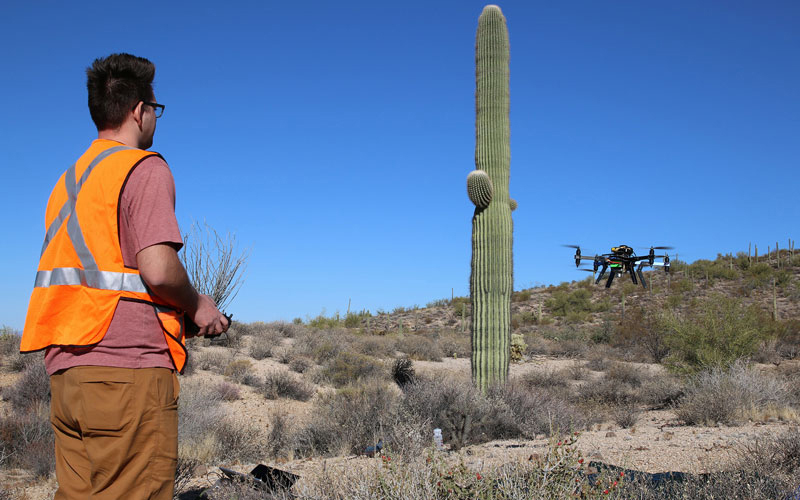
Ben Stinnett, a student in the Arizona State University robotics program and a quad-copter pilot, guides in his research drone for a smooth landing. (Photo by Ty Scholes/Cronkite News)
A bill making its way through the state Legislature would introduce a statewide drone policy and invalidate cities’ attempts to regulate the devices.
State Sen. John Kavanagh, R-Scottsdale, introduced SB 1449, which would prohibit the use of drones within the vicinity of certain public facilities or above private land without the consent of the owner. It also would prevent cities from enacting their own drone ordinances and supersede any existing municipal regulations.
“I was contacted by some of the private companies, folks who use drones for deliveries, over their concerns that individual cities and towns were passing their own ordinances, creating a patchwork of conflicting regulation throughout the state, which would have made it difficult for them to conduct their commerce,” Kavanagh said.
The bill is slated to go before the Senate Transportation Committee at 2 p.m. on Tuesday.
If the bill passes, it would impact drone users in Paradise Valley, where the town council unanimously passed a more restrictive drone ordinance in late 2015. That rule prohibits flying drones in public spaces without an event permit, effectively limiting hobbyists to their own backyards.
Kavanagh said he introduced the bill to combat ordinances like Paradise Valley’s.
“In addition to being in total contradiction and violation of federal law, it’s way too restrictive,” Kavanagh said of the Paradise Valley ordinance. “They can’t control the flight patterns of drones. Federal law precludes local regulation of flight patterns or elevations.”
Paradise Valley Mayor Michael Collins, who introduced the ordinance, did not respond to requests for comment.
The Phoenix City Council also was considering a drone ordinance, primarily pursued by Councilmen Sal DiCiccio and Michael Nowakowski, but it decided to table consideration until April in anticipation of a response from the Legislature.
Phoenix’s proposed ordinance would have followed a similar approach to SB 1449, with restrictions on flying near government facilities or over private property. Unlike Paradise Valley, it would not have required permits for use in public spaces.
Bill Mar, racing director and coordinator for the Phoenix Area Drone User Group, a hobbyist organization, said he would support a statewide statute, but that it’s important for average users to be just as involved in its creation.
“Groups like us, that are really the true stakeholders, are going to be around a lot longer after the lawyers go home,” Mar said. “We’re going to be in it to make sure our interests are upheld.”
The conversation surrounding drones comes at a time when sales are booming. In 2015, the Consumer Technology Association projected drone sales to generate more than $100 million in revenue and move 700,000 units, a 63 percent increase from 2014.
As drones’ popularity has soared, so have concerns over safety and privacy. Some worry about drones’ potential for aerial surveillance or interference with airplanes.
Government agencies at every level are attempting to respond to the new technology. In December, the Federal Aviation Administration handed down new rules requiring drone users flying certain models to register their devices with the agency before use.
Companies like Amazon, which has announced plans to use drones for package delivery, have lobbied officials in Washington, D.C., to help shape rules on drones as the FAA revisits the issue.
It’s not just hobbyists who would feel the impact of new regulations. Elisha Dorfsmith, a Flagstaff resident and Flagstaff Liberty Alliance board member, said he opposes Kavanagh’s bill because it doesn’t explicitly prohibit law enforcement officers from using drones without a warrant.
Mark Yorri, co-owner of Phoenix Drone Services, a local drone photography business, said he believes public concerns surrounding drones are largely unfounded.
“At the end of the day, what I would like to see is for everyone to wake up and realize the drone thing is totally inflammatory,” Yorri said. “There are no drones taking out airports. There are no drones spying in your backyard. These things are just fun, hobby-grade toys, for the most part.”
Mar said problems generally only arise when consumers aren’t educated about the rules. People may have difficulty staying updated because of the shifting regulatory landscape, and retailers provide little information at the time of purchase, he said.
“They can go out and get to a retailer and get themselves a drone without even knowing what they’re doing and nobody’s going to teach them,” Mar said. “The retailers don’t tell them what to do.”